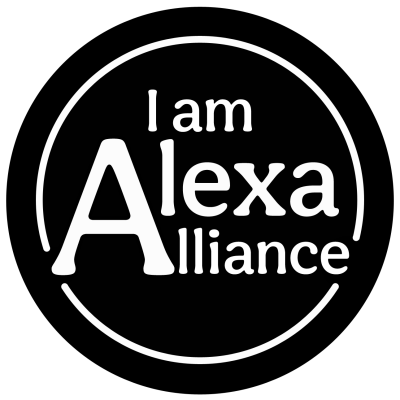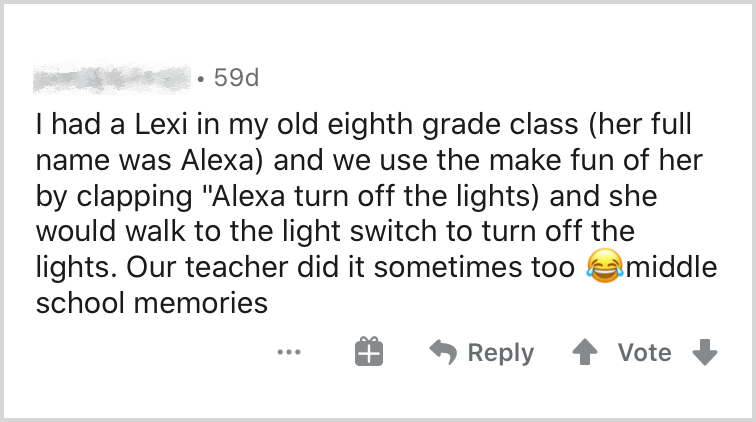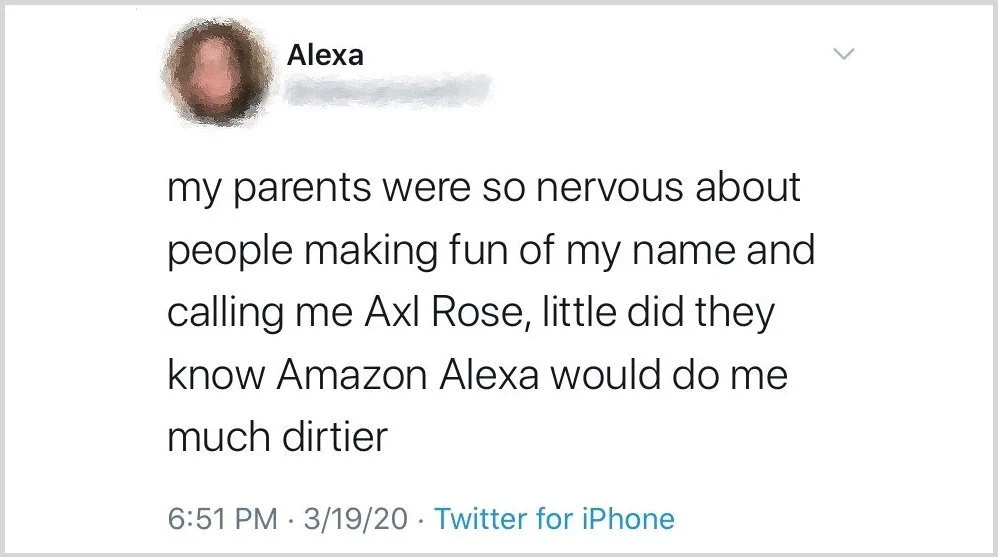The Name That People Boss Around
Humans outnumbered by machines:
How many times a day are people saying “Alexa” while using hundreds of millions of Amazon’s virtual assistant devices? How many times a day are people saying “Alexa” (or a similar name) in reference to a person? There’s no contest; the machine “Alexas” now vastly outnumber the humans. Not only has this led to the devices taking over the actual use of the name in many places, it’s also resulted in them redefining what the name now means.
Alexa, the name you boss around…
Even though people can tell the difference between a tech device and a human, most just can’t get past associating anyone named Alexa (or similar names) with barking orders at Amazon’s virtual assistant. Who can blame them? There’s never been a product on this scale, before, that requires its users to speak a real name every time they use it; it’s unprecedented, and so are the unethical outcomes.
Barking commands at people is rude, not funny:
People named Alexa (and similar) of all ages and walks of life routinely get virtual assistant commands from the people they encounter throughout their day. It’s rude to yell orders at people, especially as the opening line to someone that you’ve just met. The fact that these are the same orders usually given to a machine makes it particularly bad, because it communicates that the recipient is subhuman. Imagine having to hear people speaking to you like you’re a machine and thinking it was hilarious, repeatedly, every single day.
All name “jokes” are not created equal…
Lots of people are subjected to name jokes for various reasons, such as having the same name as a character in a movie or the title of a song. And even when there isn’t an easy reference like this, people (especially children) can always manage to find something else about someone to ridicule. But here’s where the Alexa name “jokes” differ from others:
The “jokes” immediately place their target in a subservient, subhuman role
The script, provided by Amazon, essentially writes itself
The “jokes” come from everyone and everywhere
The “jokes” come on top of all of the other problems that people named Alexa now face because of Amazon’s product, such as losing use of their name, hearing users screaming abuse at their name, and being inconvenient to have around because of their name.
A Dog Called Maggie: An Analogy of Name-related Harm
During a discussion on LinkedIn about the problems Amazon’s AI is causing people named Alexa (and similar), a woman named Maggie made the following comment: “Is this really a thing? My husband was teased relentlessly for having the same name as a popular TV character. He didn’t go on a campaign to have the character’s name changed. My name is the most popular dog name in the US. I’m not running to change my name.”
Using Maggie’s example (having the most popular name for dogs), we show (below) how Amazon’s use of the name “Alexa“ causes harm that goes way beyond most other kinds of name problems:
“When you were a child, did the adults you'd meet at places like the store or doctor's office immediately pretend to throw a ball, saying "Maggie, go FETCH!" as soon as they learned your name?
At Christmas, when you went to see Santa Claus, instead of asking you what presents you wanted, did he say, "Have you been a good little dog, Maggie, not pulling on your leash, and doing exactly what your master tells you?"
When your parents would call for you on the playground or in a store, did people look up in shock and amusement because they thought it was crazy or hilarious that anyone would name their child "Maggie", a name that's clearly just for dogs? Did people actually confront your parents and tell them that they were terrible people for giving you a dog’s name?
Was there a dog named Maggie in all of your classrooms at school that would start barking whenever the teacher called on you, interrupting the lesson and making the other kids laugh, to the point where your teachers started ignoring your raised hand because calling on you caused chaos? And did you have to hear your peers and teacher giving commands to Maggie, the dog, all throughout class, causing confusion and humiliation for you because they kept using your name in this commanding manner?
When you went over to play at other kids' houses, did the majority of them also have a dog named Maggie? A dog who'd bark loudly whenever your friends addressed you, so that they'd be yelling "Maggie, shut up!" over and over? And even though this kept happening, they wouldn't want to take the dog out of the room because they liked playing with her, so their parents would suggest that you go by another name while you were over there as a "solution"? And, later on, did those same parents complain to their own friends about what "a nightmare" it was to have you over at their house, asking why there were still people named “Maggie” when that name clearly belongs to dogs?
Did the majority of your neighbors in your apartment building or on your street also have dogs named Maggie, so that you'd be forced to hear people yelling commands at your name even when you were home?
Were people writing angry letters to the editor about how annoying it was that a person named Maggie was even allowed to be on TV or radio shows, because every time the host called her by her name, "their Maggie" would hear it, start barking, and cause a ruckus? And how no one in the media should even mention someone named “Maggie” to avoid causing this problem?”
One important difference between this example and what‘s happening to kids named Alexa (and similar) is that Maggie didn’t become a popular dog name because of a company’s product decision, whereas all of the negative outcomes for people named Alexa (and similar) are the direct result of Amazon choosing that name for their virtual assistant’s wake word and persona. They could easily fix most of these problems by rebranding, and eliminating the real name wake words.
“Imagine being a real person called Alexa, it sounds weird now.”
Yet another outcome of Amazon hijacking the name Alexa is that people now assume that someone saying, or writing Alexa (and similar names) is speaking to or about the AI, and not a human. An AI isn’t harmed if people mistake it for a person, but a person is dehumanized when they’re continuously mistaken for a machine. It’s just another problem that people named Alexa (and similar) are dealing with due to Amazon’s decision to use a real name for a device that would function just as well by a neutral word, or made up name.
Dreading when you call your own child:
Many parents of children named Alexa now inwardly cringe whenever they have to call for their children in public places, because in addition to curiosity and amusement, some bystanders are actually directing disapproval at these parents, assuming that they knowingly put their kids in the terrible position of having a name that triggers devices and is now associated with getting commands. Ironically, when a UK father of a toddler named Alexa took to an online parenting forum several years ago, wondering if he should change his daughter’s name, most of the people responding told him not to, saying it wasn’t that big of a deal, and the devices were just a passing fad.
Next: The New Noise Pollution



























































































































































